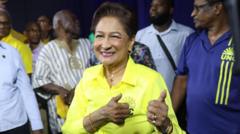In a decisive turn of events, the United National Congress (UNC) emerges victorious in Trinidad and Tobago's parliamentary elections, bringing back Kamla Persad-Bissessar to the role of Prime Minister amidst economic challenges and rising crime rates.
Opposition's UNC Triumphs in Trinidad and Tobago Election

Opposition's UNC Triumphs in Trinidad and Tobago Election
Kamla Persad-Bissessar returns as Prime Minister after decisive victory in parliamentary elections.
In a significant shift in political power, the United National Congress (UNC) has claimed victory in Trinidad and Tobago's recent parliamentary elections, as per preliminary results. This win marks the return of Kamla Persad-Bissessar, who previously served from 2010 to 2015. The UNC’s campaign focused on raising wages and generating employment opportunities, which resonated with voters during a period marked by economic difficulty.
Outgoing Prime Minister Keith Rowley of the People's National Movement (PNM) conceded defeat on Monday, acknowledging a challenging night for his party. Rowley had served as prime minister since 2015 until his resignation earlier this year, handing the role to his successor, energy minister Stuart Young. However, Young's decision to call a snap election shortly after his appointment raised eyebrows, amid claims by the opposition of unconstitutionality.
The elections came during a tumultuous period for Trinidad and Tobago, which has faced surging homicide rates and economic stagnation. The previous PNM government had implemented a state of emergency to address these crises, with tensions running high.
During her victory speech, Persad-Bissessar vowed to prioritize public sector salary increases, reinforcing her commitment to the well-being of senior citizens and public servants. Her addresses also included commitments to reopen children's hospitals and create over 50,000 new jobs, promising that "when UNC wins, everybody wins."
The victory of the UNC signals a pivotal moment in Trinidad and Tobago’s political landscape, reflecting the pressing demands of the electorate for effective governance and relief from socioeconomic challenges.


















